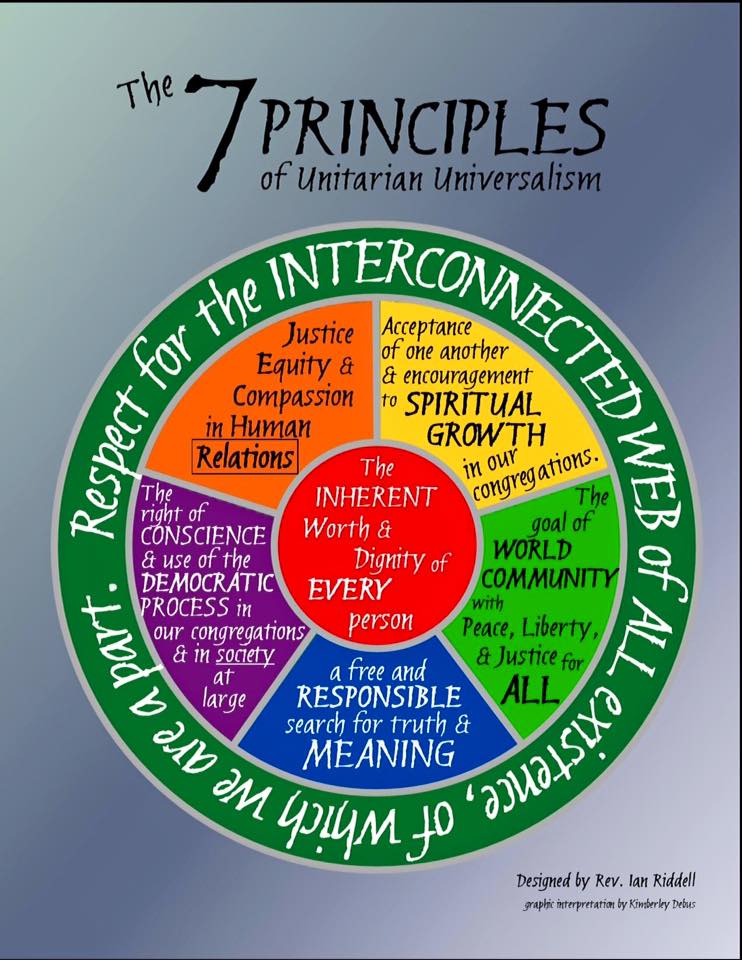What is Unitarian Universalism?
Unitarian Universalism is a liberal religious denomination with a more than 400-year history. During that time, our members have included Ralph Waldo Emerson, Louisa May Alcott, Henry David Thoreau, Clara Barton, e. e. cummings, Beatrix Potter, Frank Lloyd Wright, Florence Nightingale, and Adlai Stevenson.
Unitarians split from trinitarian Congregational churches (now mostly part of the United Church of Christ) in the early 19th century. At the time, Unitarians professed a belief in the unity of God (rather than the trinity) and the humanity of Jesus, who was seen as a divinely-inspired prophet. Universalists in the US founded their own religious movement in 1793 based on the doctrine of universal salvation–the understanding that a loving God would not damn any human to suffering in hell. Over time, both groups became more open in their beliefs and practices, culminating in the consolidation of the denominations into one in 1961 without dogma or creed.
Unitarian Universalist congregations (sometimes called churches, fellowships or societies) are independent organizations but are members of the Unitarian Universalist Association. Each congregation elects its own officers, calls its own minister, and raises its own funds. There is no church hierarchy and no central authority.
Unitarians split from trinitarian Congregational churches (now mostly part of the United Church of Christ) in the early 19th century. At the time, Unitarians professed a belief in the unity of God (rather than the trinity) and the humanity of Jesus, who was seen as a divinely-inspired prophet. Universalists in the US founded their own religious movement in 1793 based on the doctrine of universal salvation–the understanding that a loving God would not damn any human to suffering in hell. Over time, both groups became more open in their beliefs and practices, culminating in the consolidation of the denominations into one in 1961 without dogma or creed.
Unitarian Universalist congregations (sometimes called churches, fellowships or societies) are independent organizations but are members of the Unitarian Universalist Association. Each congregation elects its own officers, calls its own minister, and raises its own funds. There is no church hierarchy and no central authority.
Belief
This is usually the most important issue in trying to understand a religious organization: What do they believe? Unitarian Universalism is unique in that there is no single doctrine or creed to which everyone must subscribe. The following principles come closest in describing what Unitarian Universalists believe:
This is usually the most important issue in trying to understand a religious organization: What do they believe? Unitarian Universalism is unique in that there is no single doctrine or creed to which everyone must subscribe. The following principles come closest in describing what Unitarian Universalists believe:
- We believe in the freedom of religious expression. All individuals should be encouraged to responsibly develop their own personal theology, and to be open about their religious opinions without fear of censure or reprisal.
- We believe in the toleration of religious ideas. We gather as a community of diverse theologies, understanding that it is better to be in community than to agree.
- We believe that whatever is ultimately true about the great and unprovable questions of theology, we have the power to create a better and more just world in our lifetime.
- We believe in the worth and dignity of each human being. All people on earth have an equal claim to life, liberty, and justice—and no idea, ideal, or philosophy is superior to a single human life.
- We believe in the ethical application of religion. Good works are the natural product of a good faith, the evidence of an inner grace that finds completion in social and community involvement.
- We believe in the motive force of love. The governing principle in human relationships is the principle of love, which always seeks the welfare of others and never seeks to hurt or destroy.
- We believe in the authority of reason and conscience. The ultimate arbiter in religion is not a church, or a document, or an official, but the personal choice and decision of the individual.
- We believe in the never-ending search for Truth. If the mind and heart are truly free and open, the revelations which appear to the human spirit are infinitely numerous, eternally fruitful, and wondrously exciting.
- We believe in the unity of experience. There is no fundamental conflict between faith and knowledge, religion and the world, the sacred and the secular, since they all have their source in the same reality.
- We believe in the necessity of the democratic process. Records are open to scrutiny, elections are open to members, and ideas are open to criticism—so that people might govern themselves.
- We believe in the importance of a religious community. The validation of experience requires the confirmation of peers, who provide a critical platform along with a network of mutual support.
Unitarian Universalist FEllowship of Northern Westchester
Copyright 2022

